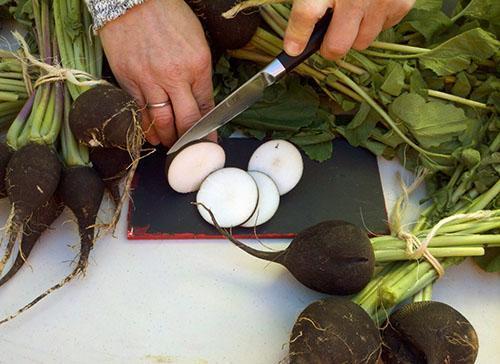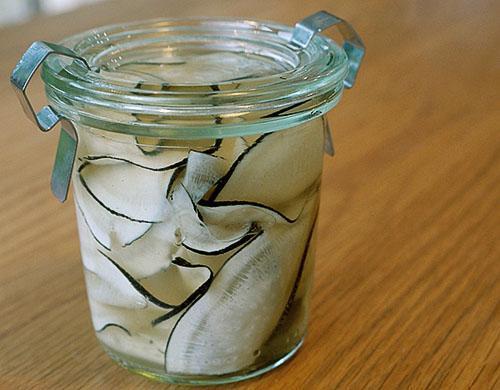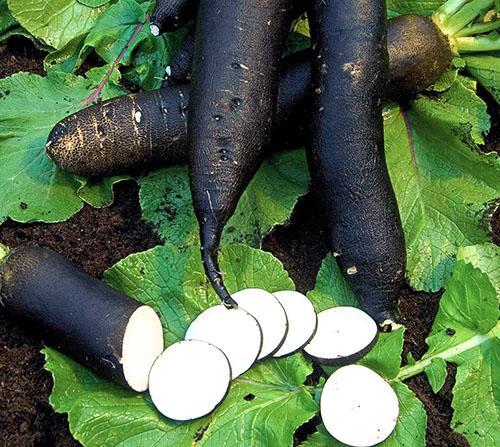The benefits and harms of black radish
 Black radish, the sharpest variety of sown radish, has long been revered in Russia. This unpretentious root vegetable was included in the diet of almost all segments of the population both in summer and in winter, when there were very few fresh vegetables left.
Black radish, the sharpest variety of sown radish, has long been revered in Russia. This unpretentious root vegetable was included in the diet of almost all segments of the population both in summer and in winter, when there were very few fresh vegetables left.
Among the people, root crops with a rather rough surface layer and juicy snow-white pulp were appreciated not only for their culinary qualities, but also for the beneficial properties of black radish. Slices of this vegetable added to pickled apples, vegetable and mushroom pickles, or sauerkraut prevented mold and spoilage. From time immemorial, folk methods of using black radish for colds, rheumatism, vitamin deficiencies and other ailments have been known. Radish with honey is still the most popular recipe for seasonal bronchitis and rhinitis.
Today, a useful plant can be found infrequently in garden beds. This is due to the spread of other less pungent varieties of the crop: radish, Japanese and Chinese radish.

Read also the article: what is the use of radishes?
Chemical composition and caloric content of black radish
 Like all root crops belonging to this genus, black radish is low in calories. There are only 36 kcal per 100 grams of fresh vegetable. But the vitamin and macronutrient composition is much richer. In addition to vitamin C, the white spicy pulp contains vitamins E and PP, a small amount of beta-carotene, and a number of representatives of group B: B1, B2, B5, and B6. Macronutrients in the composition of black radish are represented by calcium, magnesium, potassium, phosphorus and sodium, iron is present in the form of a trace element.
Like all root crops belonging to this genus, black radish is low in calories. There are only 36 kcal per 100 grams of fresh vegetable. But the vitamin and macronutrient composition is much richer. In addition to vitamin C, the white spicy pulp contains vitamins E and PP, a small amount of beta-carotene, and a number of representatives of group B: B1, B2, B5, and B6. Macronutrients in the composition of black radish are represented by calcium, magnesium, potassium, phosphorus and sodium, iron is present in the form of a trace element.
The beneficial properties of black radish are not only in the presence of mineral salts and vitamins. 100 grams of radish accounts for 88 grams of water, 1.9 grams of protein, only 0.2 grams of fat, 2.1 grams of valuable dietary fiber and 1 gram of ash, as well as 6.7 grams of carbohydrates, which include 6.4 grams saccharides and only 0.3 grams of starch.
Black radish: useful properties of root crops in the treatment of diseases of internal organs
Due to their low calorie content and high dietary fiber content, black radish roots can be used in the menu of those who decide to lose a few extra pounds.
At the same time, the vegetable promotes weight loss due to its mild diuretic effect. Since the loss of moisture is compensated by the mineral salts contained in the roots, the electrolyte balance of the body is not affected.
The abundance of fiber helps to quickly and effectively cleanse the intestines from accumulating toxins.
 therefore black radish useful not only for those who are losing weight, but also for everyone who cares about their own health and the quality of digestion. A sedentary lifestyle and an improperly selected diet cause rotting and fermentation in food residues that do not leave the intestines in time. Gases begin to be actively produced, foci of inflammation develop, and dysbiosis occurs.
therefore black radish useful not only for those who are losing weight, but also for everyone who cares about their own health and the quality of digestion. A sedentary lifestyle and an improperly selected diet cause rotting and fermentation in food residues that do not leave the intestines in time. Gases begin to be actively produced, foci of inflammation develop, and dysbiosis occurs.
What is the use of radish for those who want to cleanse the body and put in order digestion?
With the regular use of dishes made from fresh, pickled or even heat-treated root crops, the likelihood of such accumulations in the intestines and unpleasant painful symptoms drops sharply.
The active substances in the black radish have a stimulating and local irritating effect on the walls of the digestive tract. Consequently:
- improves blood supply to the digestive system;
- its tone is normalized;
- completely pathogenic microflora is suppressed and destroyed;
- the working capacity of the intestine is improving;
- constipation disappears.
 The bile and diuretic properties of black radish are used in the formation of stones in the gallbladder and urogenital organs. In the same cases, radish juice with honey or in pure form in small quantities is used as a natural antispasmodic and distracting agent.
The bile and diuretic properties of black radish are used in the formation of stones in the gallbladder and urogenital organs. In the same cases, radish juice with honey or in pure form in small quantities is used as a natural antispasmodic and distracting agent.
Black radish is highly prized for its beneficial bactericidal properties.
Phytoncides of this vegetable counteract microorganisms and bacteria during viral and colds. At the same time, the beneficial effect of root crops lies not only in this. The beneficial properties of black radish help:
- strengthen immunity;
- relieve pain;
- relieve coughing spasms;
- faster and easier sputum to pass;
- in the organization of prevention and treatment of inflammation;
- to raise the tone of the body and replenish its vitamin reserve.
When coughing, the traditional folk remedy is rare juice obtained by mixing radish pulp with honey or sugar.
 One root vegetable will require 1-2 tablespoons of honey, and a delicious medicine is ready three hours after preparation. Radish syrup with honey saturated with vitamins, active substances and microelements is taken 30 minutes before a meal, 1-2 tablespoons.
One root vegetable will require 1-2 tablespoons of honey, and a delicious medicine is ready three hours after preparation. Radish syrup with honey saturated with vitamins, active substances and microelements is taken 30 minutes before a meal, 1-2 tablespoons.
However, the beneficial properties of black radish are not limited to this. The vegetable effectively cleanses the circulatory system of cholesterol accumulations and prevents new plaques from forming.
Calcium and magnesium, which is a part of root vegetables, have a beneficial effect on the heart muscle and blood vessels in case of hypertension, arrhythmias and other problems of the cardiovascular system.
In this case, both radish juice and honey are taken, and dishes with fresh root vegetables are added to the menu.
Useful properties of black radish when used externally
 But the pulp of black radish is used not only for food, it can have its healing effect when applied externally:
But the pulp of black radish is used not only for food, it can have its healing effect when applied externally:
- It is, for example, an effective remedy for the treatment of abscesses and skin rashes.
- Lotions and compresses with radish will relieve muscle and joint pain, as well as suffering from gout and rheumatism.
- Rare juice in the form of lotions and rubbing, with regular use, activates the work of hair follicles and stimulates hair growth.
Similar to the root crops of black radish, its seeds also have useful properties.
The steamed seed compress can be used for cosmetological purposes to combat minor inflammation and circles under the eyes, bruises and wrinkles, since such a procedure will not only improve the blood supply to tissues, neutralize bacterial flora and even subcutaneous parasites.
Contraindications and precautions for eating black radish
 With all the uniqueness of the composition, the abundance of vitamins and active substances, root crops can bring both benefits and harm if black radish is consumed without measure and following the recommendations of doctors.
With all the uniqueness of the composition, the abundance of vitamins and active substances, root crops can bring both benefits and harm if black radish is consumed without measure and following the recommendations of doctors.
Black radish should not be included in the menu of children under the age of three, as well as women in a state of pregnancy.
Black radish is highly not recommended for people who have had a heart attack. And patients who are observed for diseases of the liver and kidneys should eat root vegetables with great care.
One of the sources of both the benefits and harms of black radish is rare oil glycosides.These substances have an active irritating effect on the mucous membranes and tissues of internal organs, therefore, radish is contraindicated in the presence of:
- peptic ulcer;
- diseases of the digestive system in the acute stage;
- gastritis with high acidity.
Since some people have individual food intolerance to radish dishes, it is necessary to introduce this culture into your diet very carefully, starting from 30-50 grams.
At the slightest symptoms of allergic reactions, spasms, pains or other symptoms, you need to remember that, in addition to useful properties, black radish has contraindications, which means that it is better to refuse juicy salad and consult a medical specialist.